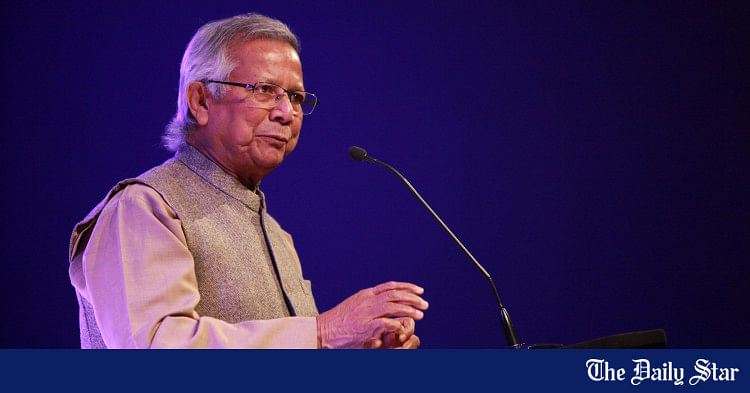How can the nation seize this moment to build a better Bangladesh under the leadership of our Nobel laureate, Professor Mohammad Yunus? PHOTO: REUTERS
“>
How can the nation seize this moment to build a better Bangladesh under the leadership of our Nobel laureate, Professor Mohammad Yunus? PHOTO: REUTERS
Bangladesh is finally free from the autocratic rule of Sheikh Hasina after 15 long years of oppression. Many have expressed that we have attained independence for ourselves for the second time. While this is indeed a moment to celebrate, it is also a critical juncture for the nation. Currently, there is no government (elected or otherwise), and chaos reigns, evidenced by vandalism, arson, and attacks on minority communities while the police forces called for a strike in protest against attacks by enraged citizens. The nation urgently needs to restore law and order, while the interim government formation is underway.
The student-led movement has kindled hope among the people, fundamentally presenting an opportunity to reform society. The people do not want to see a repeat of autocratic behaviour by another elected government, where crime, oppression, and inequality persist, only with different players switching sides. While there is relief and optimism about building a “new Bangladesh,” the future of the interim government, its scope of work, and its approach remain uncertain.
Bangladesh has faced similar situations before, where autocrats or governments were forced to resign. Recall the popular uprising of 1990, the forced resignation of the short-lived elected government of 1996, or the bloody end of 2006 leading to 1/11. Each time, a non-political government was formed, it ultimately failed to meet the people’s hopes. Unfortunately, each successive political government has often surpassed its predecessor’s excesses in autocratic behaviours, corruption, and oppression. The people deserve not to have these experiences repeated. The question is, how can the nation seize this moment to build a better Bangladesh under the leadership of our Nobel laureate, Professor Mohammad Yunus?
Unfortunately, the people of Bangladesh do not have good experience with any political parties. While Sheikh Hasina’s government reached unprecedented levels of corruption and oppression in the past 15 years, the end of the previous BNP government was also marred by similar issues. The shadow government of “Hawa Bhaban,” attacks on the opposition with military-grade grenades, and the infamous “Joj Mia” drama are still fresh in our memories. History teaches us that those who gain power often repeat the mistakes of their predecessors. People want to avoid this scenario in the future. The martyrs of this movement and the entire nation deserve to hold on to this newly achieved liberation, and those in power owe nothing less to the nation. How can the new interim government deliver on these hopes?
If the interim government conducts an election quickly, there is no reason to expect a significant change in political behaviours and norms. The election would merely change the faces in power, not the system. The oppressed parties could become the oppressors, leaving the general people’s fate unchanged. This is not the outcome the nation deserves. To prevent a recurrence and fulfil the essence of the youth movement, the interim government must do more than just conduct an election within 90 days. But how much more should they aim to accomplish? What legal or constitutional basis will they have? Will they have sufficient support from government officials who have previously engaged in corruption and political patronage?
In 2007, an army-backed non-political government attempted a political clean-up by targeting corruption, particularly among politicians. Both major political parties’ leaders were detained, and there was a push to reform politics within these parties. However, many involved in the clean-up mission soon succumbed to corruption themselves. Ultimately, an election was held which put Awami League in power in 2009. The previous caretaker government’s failure was partly due to its attempt to achieve too much in a short time without constitutional authority or adequate support. The current situation is as complex as it was during the 2007-2009 period.
Therefore, it is crucial to establish clear principles and approaches for this sought-after transformation. Identifying and addressing key issues will be essential to fulfilling the essence of the student-led movement against discrimination and ensuring effective progress.
One key demand is the abolition of politics dominated by family nepotism. Leadership should be earned through merit, not inherited through family hierarchy or connections. The current practice of nepotism is prevalent from the highest echelons of government down to the local level, allowing power to be concentrated within select families. Eliminating this family-based “quota system” would empower the populace and shift control away from entrenched dynasties. Such a shift in power distribution would significantly reduce corruption and oppression. In essence, political parties must embody democratic principles internally. The selection of party leadership or nominees for national elections should be determined through internal party elections. This process would ensure accountability, promote skilled and capable leaders, and foster a more transparent and effective political environment.
The new government must also find a solution that upholds the fundamental principle of democracy and ensures a stable and fair transition of power. Other areas of reform include the police and civil administration. Corruption generally occurs with the sponsorship of politicians, which gives government employees a license to conduct their own corrupt activities, leaving ordinary people as the victims. The employment process for government jobs is not only influenced by quotas—which sparked this whole movement—but often political recommendations and bribery are used to secure government jobs. Ensuring that government employment is based solely on merit, without political influence, bribery, or other mechanisms, is what people deserve. We need to find a way to reform the employment process to give everyone an equal chance.
The other problem that needs fixing is that of a free press. The country has experienced unprecedented levels of censorship. Under Hasina’s autocratic government, there were even instances of internet and communication blackouts, isolating the nation from the rest of the world. Over the past 15 years, television channels and newspapers have largely lacked freedom. A democracy cannot survive without a free press and Bangladesh deserves nothing less. Lastly, the judiciary must be free from administrative interference to ensure fair and impartial justice. In recent times, we have witnessed numerous questionable decisions and proceedings, highlighting the deep intertwining of the judiciary with the government. This issue extends from the lower courts to the highest court in the land.
Bangladesh stands at a crossroads with the fall of Sheikh Hasina. While challenges remain, there is a unique opportunity to reform and progress toward a better democracy. The interim government must focus on creating an environment conducive to democracy, peaceful power transitions, equal employment opportunities, and a free press and judiciary. Professor Yunus’s respected leadership brings hope, and the nation wishes the new government success in delivering for the people.
Mohasin Mithu leads organisational transformation and currently is the vice president of Revenue Growth Management at PepsiCo Beverage North America.
Views expressed in this article are the author’s own.
Follow The Daily Star Opinion on Facebook for the latest opinions, commentaries and analyses by experts and professionals. To contribute your article or letter to The Daily Star Opinion, see our guidelines for submission.




